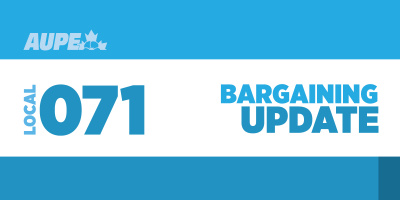Ethics are taught in the classroom, but are missing from the workplace
The decision to change caretaker shifts at the University of Calgary caused real hardship for many of the 200 workers.
About half lost the premium shift pay of $2.50 per hour, which brought the income for full-time workers below a living wage. For a full-time caretaker earning about $32,000 per year, it meant a loss of about $5,000, or about $400 per month.
That’s a tough financial hit, especially with high levels of inflation making food, rent, transportation and all essentials much more expensive.
The change in schedules brought conflicts for members working two or more jobs, meaning some had to give up one of their jobs and sources of income. Travel to and from work on public transit became harder because of the starting and finishing hours.
Many of the caretakers are women, people of colour and newcomers to Canada. They are the lowest-paid workers at the university and the most vulnerable people on campus.
These are the people that Equity, Diversity and Inclusion (EDI) protocols are supposed to protect. AUPE has asked the University of Calgary repeatedly if EDI principles were applied when the decision was made to change the shifts, but the university has refused to answer.
The university, it seems, doesn’t understand or care what it’s like to be a vulnerable worker on campus.
Here are examples of what caretakers have said about the shift changes and their work keeping the university a clean and safe place for others to work and study. Their stories reflect what has happened to many of their fellow workers.
We are not naming the workers to protect them from being targeted by university managers for speaking out.
Caretaker 1
“We have an ethics course, right? … Why are we teaching it and not practising it?”
Caretaking at the university is a difficult job. She often worked alone, even in areas where that could be dangerous, such as when cleaning stairs where there’s a risk of falling.
There are rules that say she should not work alone, but they aren’t enforced.
“It's too hot. And I am alone. ... I didn't know that you have to be two, there has to be two of you in that very vicinity. I didn't know that.”
Often, the lead hand on the crew would ask if she was OK working alone.
“What am I going to say? I want to stay, right? So, I said I'm OK. But I tell you when I get home, I'm a vegetable. Imagine yourself working backwards on the stairs alone,” she says.
This caretaker had been working from 2 p.m. to 10 p.m., which meant she earned the $2.50 per hour shift premium. Then the university changed her shift, so she started at 1:30 p.m. and finished at 9:30 p.m. The only reason for this was to deprive workers of the shift premium.
“An increment of 30 minutes – isn't that a slap on the face? … Where's the heart? That's what I'm asking. Where is your heart? Where is your compassion? These people work three jobs and you took $400 almost from their paycheque.”
Changing shifts affected some of her colleagues with second jobs, she says. There just isn’t enough time to get from one job to another, especially for those who rely on public transit, which is common for low-income workers who can’t afford a car.
Some caretakers had to quit the university or a second job because of scheduling conflicts.
All of this is for less than a living wage.
“They certainly they don't pay you enough or give you enough hours to make it a job that you can live on,” she says. “I was forced to get another cleaning job, because I lost the $400.”
This left her working full time at the university and taking another part-time job to replace the income she lost. She would get up at 5 a.m. to start her new job and would then report to the university at 1:30 for a full eight-hour shift.
This is what happens when you slash the pay of people earning low wages.
She describes the work atmosphere at the university as “toxic” and that it’s been that way for some time.
“But I tell you, if I did not have a union … I would not be here talking to you. I'd probably be dead by now. I'd probably have committed suicide. I was close. I was close. I went to a psychologist … because of the way I was being treated. I couldn't handle it any more,” she says.
If she could send a message to Ed McCauley, the university president and vice-chancellor, what would it be?
“I would tell him to investigate how are we being treated as caretakers. You said there's equity and diversity. Where is that? I can't find it. We have an ethics course, right? … Why are we teaching it and not practising it? That's the question I'm going to ask.”
Caretaker 2
“How can I meet these expenses? Just tell me? Should I stop eating?”
This caretaker was working less than full time (0.7 full-time equivalent) and lost $300 per month when the shifts were changed, which “totally crashed” the family’s budget.
He now earns $17.25 per hour, close to minimum wage and below a living wage for Calgary. In 2001, he earned $17 per hour.
“Our payment at the (gas) pump or in the grocery store is not going to be less. Every day it is jumping,” he says.
He lives paycheque to paycheque. “I don't have any luxuries. Just pay the bills and keep going. No savings. Nothing. Just keep going.”
The math is simple, he says. He takes home about $1,800 per month. His rent is $1,050; car and home insurance are about $400; utilities cost about $400.
“How can I meet these expenses? Just tell me? Should I stop eating?”
The only solution he has is to build up credit-card debt.
Asked how he felt when the university announced it was changing his shifts, he says: “I am so angry with them that they made the decision without even asking any of any one of us. … There are people who worked here 25-30 years. Ask them: Is this going to affect your job?”
The effect on the cleaners’ ability to do their jobs is the other factor that the university didn’t consider.
All cleaning is now done while students and teachers are on campus.
“If I turn on the vacuum, the classroom will be disturbed. With people moving around, I can't run the (cleaning) machines. If I hit somebody, I'll be responsible because I am the driver. I'm scared to do that,” he says. “Machines are sitting idle.”
The university didn’t consider the financial hardship the shift changes would have on workers. It didn’t consider how it would make cleaning the campus more difficult.
A year ago, because of the COVID-19 pandemic, cleaning was the most important thing on campus. Workers were going above and beyond their normal duties, putting on hazmat suits and sanitizing everything to keep the campus community safe.
Now, cleaning doesn’t seem to matter as much, although the pandemic is far from over.
All they thought about was money – a line item on a budget. With some innovation, creativity and input from workers, they could have found savings another way, he says.
To read about AUPE Local 052’s efforts to have EDI principles applied to this decision, read this Member Update.
To take action to support caretakers, please click here.
AUPE members have access to work-related crisis counselling through Solareh 24 hours a day, seven days a week, 365 days a year. They can be reached at 1-844-744-7026. Download a copy of the services available here.
(Are you a caretaker at the University of Calgary? Do you have a story to tell? Please email [email protected].)

